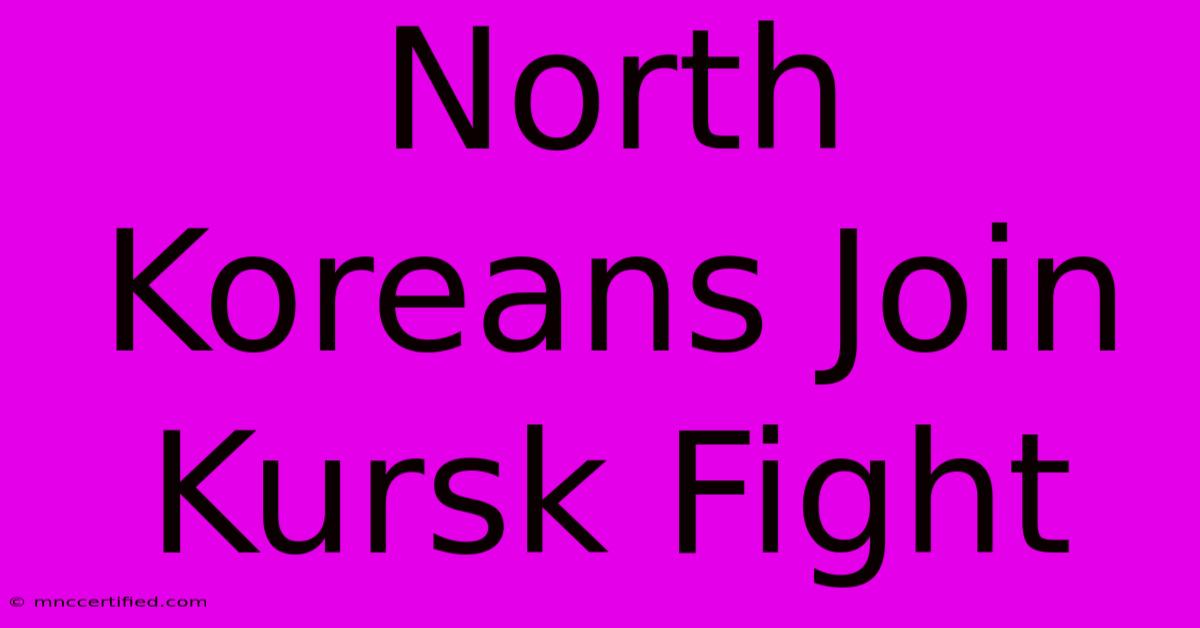North Koreans Join Kursk Fight

Table of Contents
North Koreans Join Kursk Fight: Separating Fact from Fiction
The claim that North Korean troops participated in the Battle of Kursk (July–August 1943) is a persistent, yet largely unsubstantiated, historical rumour. While there's no credible historical evidence supporting this assertion, its enduring presence online necessitates a thorough examination. This article will delve into the available evidence, analyze the logistical and strategic improbabilities, and address the reasons why this myth persists.
The Absence of Concrete Evidence
The core problem with the claim of North Korean involvement in Kursk is the stark absence of verifiable evidence. Historians, military analysts, and archival researchers haven't uncovered any documentation – from Soviet, German, or even North Korean sources – to support the participation of North Korean troops in this pivotal battle of World War II. This lack of evidence is significant. The scale of the Battle of Kursk, involving millions of soldiers, makes it highly unlikely that such a large-scale deployment could remain undocumented.
Logistical Impossibilities
Even beyond the lack of direct evidence, the logistical challenges of deploying North Korean troops to the Eastern Front in 1943 were insurmountable. Considering the vast distances involved, the limited infrastructure, and the ongoing war in the Pacific, transporting a significant force from Korea to the Kursk region would have been a monumental, near-impossible task. Such a movement would have undoubtedly left a substantial trace in historical records, which is conspicuously absent.
Strategic Incoherence
From a strategic perspective, the deployment of North Korean troops to Kursk makes little sense. While the Soviet Union and North Korea later formed an alliance, in 1943, Korea was under Japanese occupation. The Soviets were primarily focused on defeating the German army, and diverting resources to a relatively small, geographically distant contingent would have been strategically unsound.
The Persistence of the Myth: Misinformation and Online Propagation
Despite the lack of evidence, the claim persists, primarily through online platforms and less credible historical sources. This highlights the challenges of combating misinformation in the digital age. The rumour likely stems from several factors:
- Confusion with later Korean War involvement: The Korean War (1950-1953) saw significant involvement from both Soviet-backed North Korea and US-led forces. This later conflict might be confused with events during World War II.
- Propaganda and Conspiracy Theories: The narrative could be fueled by nationalistic or anti-communist propaganda, aiming to discredit either the Soviet Union or North Korea.
- Lack of Historical Literacy: Many online claims lack rigorous historical sourcing, relying on anecdotal evidence or unsubstantiated assertions.
Conclusion: The Importance of Critical Historical Analysis
The claim of North Korean participation in the Battle of Kursk remains firmly in the realm of speculation. The lack of credible evidence, the logistical improbabilities, and the strategic inconsistencies strongly suggest that this assertion is unfounded. This case serves as a crucial reminder of the importance of critical historical analysis and the need to rely on verifiable sources when examining historical events. Responsible online engagement requires verifying information and challenging unsubstantiated claims to combat the spread of misinformation. Always prioritize reputable historical sources and academic research when exploring such topics.

Thank you for visiting our website wich cover about North Koreans Join Kursk Fight. We hope the information provided has been useful to you. Feel free to contact us if you have any questions or need further assistance. See you next time and dont miss to bookmark.
Featured Posts
-
Dot Physical Covered By Insurance
Nov 19, 2024
-
Trump Nominates Brendan Carr For Fcc Chair
Nov 19, 2024
-
Giants Qb Change Jones Out Tommy In
Nov 19, 2024
-
Chiefs Blood Drive Chiefs Week
Nov 19, 2024
-
Spirit Airlines Faces Bankruptcy
Nov 19, 2024